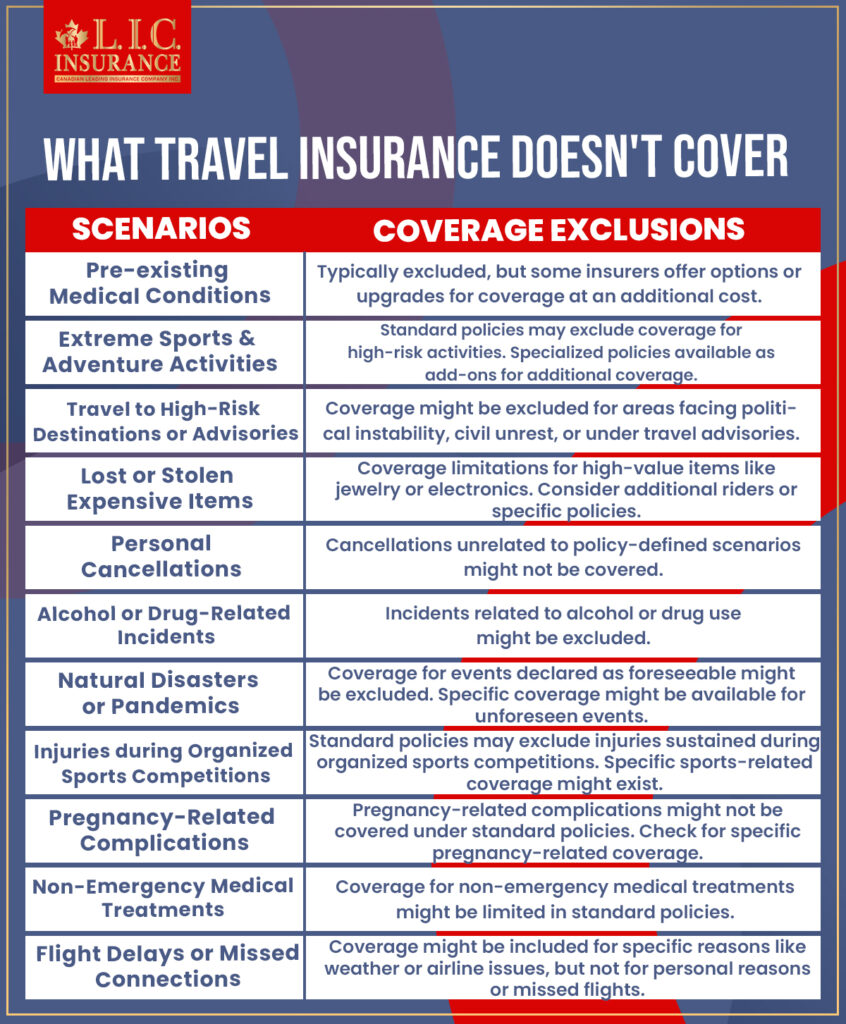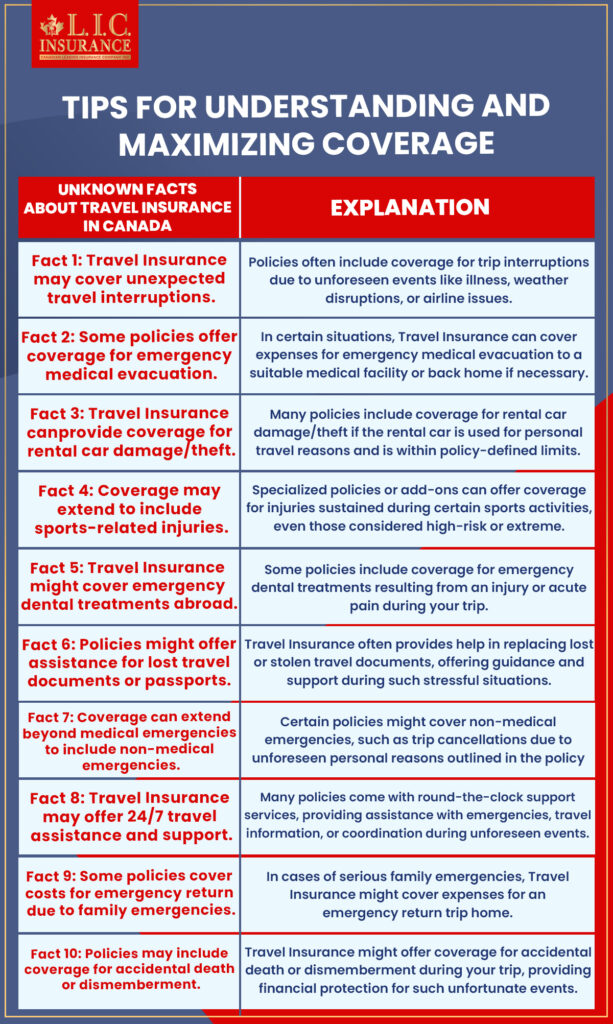
December 12, 2023, Harpreet Puri, 6 Mins
Travel Insurance serves as a very important net of safety, offering a shield of protection during your journeys. It’s like a trustworthy companion, ready to step in when unexpected situations arise. This coverage is designed to provide mental peace, ensuring you’re not left stranded in the face of unforeseen circumstances.
The core purpose of Travel Insurance is to provide you with proper safety against the unexpected—whether it’s medical emergencies, trip cancellations, lost baggage, or other unforeseen mishaps. It acts as a financial protection, coming to your aid when things don’t go according to plan.
Want to know the need for Travel Insurance?- Go here
While Travel Insurance coverage is undeniably valuable, it’s equally important to recognize its boundaries. Knowing what your policy includes—and what it doesn’t—is crucial. Understanding these limitations can prevent surprises or disappointments, ensuring you’re well-prepared for any potential gaps in coverage.
However, even the most comprehensive Travel Insurance coverage may have its limitations. These limitations are like boundaries that define what the policy can and cannot cover. It’s essential to acknowledge and comprehend these limitations to make informed decisions and explore additional options when necessary.
By comprehending the purpose and significance of Travel Insurance coverage, travellers can make educated choices, ensuring they’re adequately protected during their adventures while being aware of the scope and limitations of their insurance policy.
Find out about the worth of buying travel insurance online here

Even though Travel Insurance acts as a safety cushion, it’s essential to recognize its limitations. While it offers extensive coverage, there are certain scenarios where its protection may not extend.
One of the common exclusions in many Travel Insurance policies involves pre-existing medical conditions. This means if you have a medical condition before purchasing the policy, such as diabetes or heart disease, treatment related to these conditions might not be covered during your travels. It’s crucial to disclose any pre-existing conditions when purchasing insurance, as this impacts coverage and potential claims.
Adventure seekers, take heed! A lot of standard Travel Insurance policies do not provide coverage for high-risk activities like bungee jumping, skydiving, or even scuba diving beyond certain depths. Engaging in these activities might nullify your coverage, so it’s essential to check the policy’s fine print and consider additional coverage if planning such activities.
Certain destinations with high political instability or travel advisories may not be covered by Travel Insurance. Areas facing civil unrest, war, or known for heightened risks might fall under exclusions. Always check the destination’s status and travel advisories to ensure your insurance provides coverage.
Engaging in illegal activities or behaving recklessly can void your insurance coverage. This includes ignoring travel advisories or engaging in activities against local laws. Remember, insurance is meant to protect responsible travellers, so exercising caution and abiding by regulations is crucial.
While Travel Insurance covers lost or stolen belongings, there are limits, especially for high-value items like expensive jewelry, electronic gadgets, or sports equipment. For these items, insurance might have a cap on reimbursement. Consider additional riders or specific policies for comprehensive coverage of valuables.
While it’s important to understand what Travel Insurance might not cover, it’s equally crucial to explore exceptions and potential limitations.
Not all Travel Insurance policies are cut from the same cloth. Exclusions can vary significantly between insurance providers and their policies. This means what’s excluded in one policy might be covered in another. Taking the time to read and grasp the policy documents thoroughly is a smart move before purchasing. By doing so, you’ll uncover the specific scenarios or activities that your policy might exclude. Some insurers might offer broader coverage for certain situations that others might not cover. For instance, while one policy might exclude coverage for extreme sports, another might include them. Getting to know these differences allows you to choose a policy that aligns best with your travel needs.
The good news is there are ways to fill in the gaps left by exclusions in standard policies. Supplemental policies or add-ons act as a financial security net for these limitations. Suppose you’re an adventure enthusiast planning to indulge in adrenaline-pumping activities like skydiving or mountain climbing. In that case, specialized policies tailored to cover these pursuits are available. These additional coverages might come with an added cost, but they offer mental satisfaction, especially when engaging in activities not covered by standard policies. Investing in these supplements ensures you’re covered for activities or scenarios that fall outside the scope of your primary policy.
By understanding policy-specific exclusions and exploring additional coverage options, travellers can go through potential limitations in their Travel Insurance more effectively. This proactive approach makes it possible to create a more comprehensive coverage plan that is customized as per your specific travel needs and activities.
Click here to learn about Travel Insurance Myths

Before beginning your journey, it’s wise to become extremely comfortable with your Travel Insurance Policy. Take the time to flip through the pages and understand the minutest details. Pay extra attention to the exclusions section—that’s where the policy’s limitations hide. By familiarizing yourself with these exclusions, you’ll avoid surprises if you need to file a claim. Understanding what’s covered and what’s not can save you from potential frustrations later on.
Honesty is the best policy, especially when it comes to pre-existing medical conditions. If you have any existing health issues, be upfront and declare them to your insurer when purchasing Travel Insurance. While standard policies might not cover these conditions, some insurers offer options or upgrades to include coverage for pre-existing conditions. By disclosing these conditions upfront, you pave the way for potential coverage options tailored to your needs.
Apart from exclusions, it’s essential to understand coverage limits within your policy. Some plans may have specific caps on coverage amounts for medical expenses, trip cancellations, or baggage loss. Awareness of these limits helps you manage expectations and plan accordingly.
Familiarize yourself with the procedures for emergencies covered by your policy. This includes knowing how to contact the insurer during emergencies, understanding what qualifies as an emergency, and the steps to initiate a claim. Having this information readily available can streamline the process during stressful situations.
Before your trip, make copies or digital scans of essential documents like your insurance policy, passport, ID, and itinerary. Having these backups can be a lifesaver if your originals are lost or stolen during your travels. Additionally, ensure you have the contact information for your insurer readily accessible.
Be mindful of any time constraints for filing claims. Some insurance policies have specific timeframes within which claims must be submitted after an incident occurs. Missing these deadlines could result in denial of your claim, so stay informed and act promptly if you need to make a claim.
In the case of an unfortunate event occurring during your trip, honesty is key when you file a claim. Provide accurate and truthful information supported by relevant documentation. Misrepresentation or providing false details can lead to claim denials.
Life changes, and so do travel plans. Periodically reviewing your insurance policy ensures it still aligns with your needs. If your travel habits or requirements change, consider updating or purchasing additional coverage to ensure adequate protection.
These simple yet crucial tips can make a world of difference in maximizing your Travel Insurance coverage. Taking the time to understand your policy and being transparent about any pre-existing conditions ensures you’re well-prepared and equipped for a worry-free journey. It’s all about being proactive and making informed decisions to protect your travel experience.
Here are some tips that will help you while buying Canadian Travel Insurance
Travel Insurance coverage provides invaluable support and security during trips, yet it’s imperative to acknowledge its limitations. Being aware of what your policy includes and excludes can save you from unexpected hassles during your travels. By understanding these exclusions, exploring additional coverage options, and being motivated to assess your needs, you can improve the benefits of your Travel Insurance, ensuring a worry-free and protected journey.
Remember, while Travel Insurance coverage offers substantial protection, it’s not a multi-purpose solution. Adjusting your policy to suit your specific travel plans and understanding its minor details is key to ensuring a smooth and secure travel experience.
Read about the importance of Emergency Medical Travel Insurance
Typically, standard Travel Insurance policies may not cover pre-existing medical conditions. It’s essential to review your policy to understand its stance on pre-existing conditions. However, some insurers offer options or upgrades to include coverage for these conditions for an additional cost.
Standard Travel Insurance might exclude coverage for high-risk activities like bungee jumping, skydiving, or mountain climbing. However, specialized policies tailored for adventure sports are available as add-ons for additional coverage.
Some Travel Insurance policies may exclude coverage for travel to destinations facing political instability, civil unrest, or under travel advisories. Review your policy to understand its stance on coverage for such high-risk areas.
While Travel Insurance typically covers lost or stolen belongings, there might be limitations, especially for high-value items. Certain policies might have caps on reimbursement for expensive items. Consider additional riders or specific policies for comprehensive coverage of valuables.
Travel Insurance often covers trip cancellations due to specific reasons outlined in the policy, such as illness, accidents, or natural disasters. However, cancellations due to personal reasons unrelated to policy-defined scenarios might not be covered.
Incidents related to alcohol or drug use might not be covered by Travel Insurance. Engaging in illegal or reckless behaviour leading to accidents might nullify coverage.
Yes, most Travel Insurance policies have specific timeframes within which claims must be submitted after an incident occurs. Missing these deadlines could result in claim denials, so it’s crucial to adhere to the stated time limits.
Coverage for natural disasters or pandemics can vary among policies. Some Travel Insurance may exclude coverage for events declared as foreseeable, such as pandemics, while others might offer specific coverage for trip cancellations or interruptions due to unforeseen events like natural disasters. Review your policy for details.
Medical expenses resulting from alcohol or drug-related incidents might be excluded from coverage. Engaging in activities under the influence may nullify insurance claims related to resulting injuries or accidents.
Standard Travel Insurance may exclude coverage for injuries sustained during organized sports competitions or events. However, policies specifically designed for sports-related activities or competitions might offer coverage as an add-on.
Pregnancy-related complications might not be covered by standard Travel Insurance policies. Some insurers offer specific pregnancy-related coverage, but it’s crucial to check and understand the terms and limitations of such coverage.
Coverage for non-emergency medical treatments might be limited by standard policies. These policies often prioritize emergency medical situations. However, specific policies or upgrades might offer extended coverage for non-emergency medical issues.
Travel Insurance often covers flight delays or missed connections due to specific reasons outlined in the policy, such as inclement weather or airline-related issues. However, coverage for delays due to personal reasons for missed flights might not be included.
The above information is only meant to be informative. It comes from Canadian LIC's own opinions, which can change at any time. This material is not meant to be financial or legal advice, and it should not be interpreted as such. If someone decides to act on the information on this page, Canadian LIC is not responsible for what happens. Every attempt is made to provide accurate and up-to-date information on Canadian LIC. Some of the terms, conditions, limitations, exclusions, termination, and other parts of the policies mentioned above may not be included, which may be important to the policy choice. For full details, please refer to the actual policy documents. If there is any disagreement, the language in the actual policy documents will be used. All rights reserved.
Please let us know if there is anything that should be updated, removed, or corrected from this article. Send an email to [email protected] or [email protected]